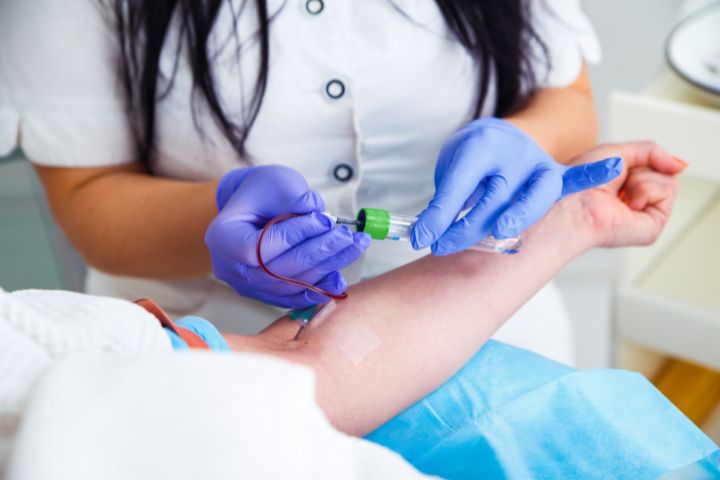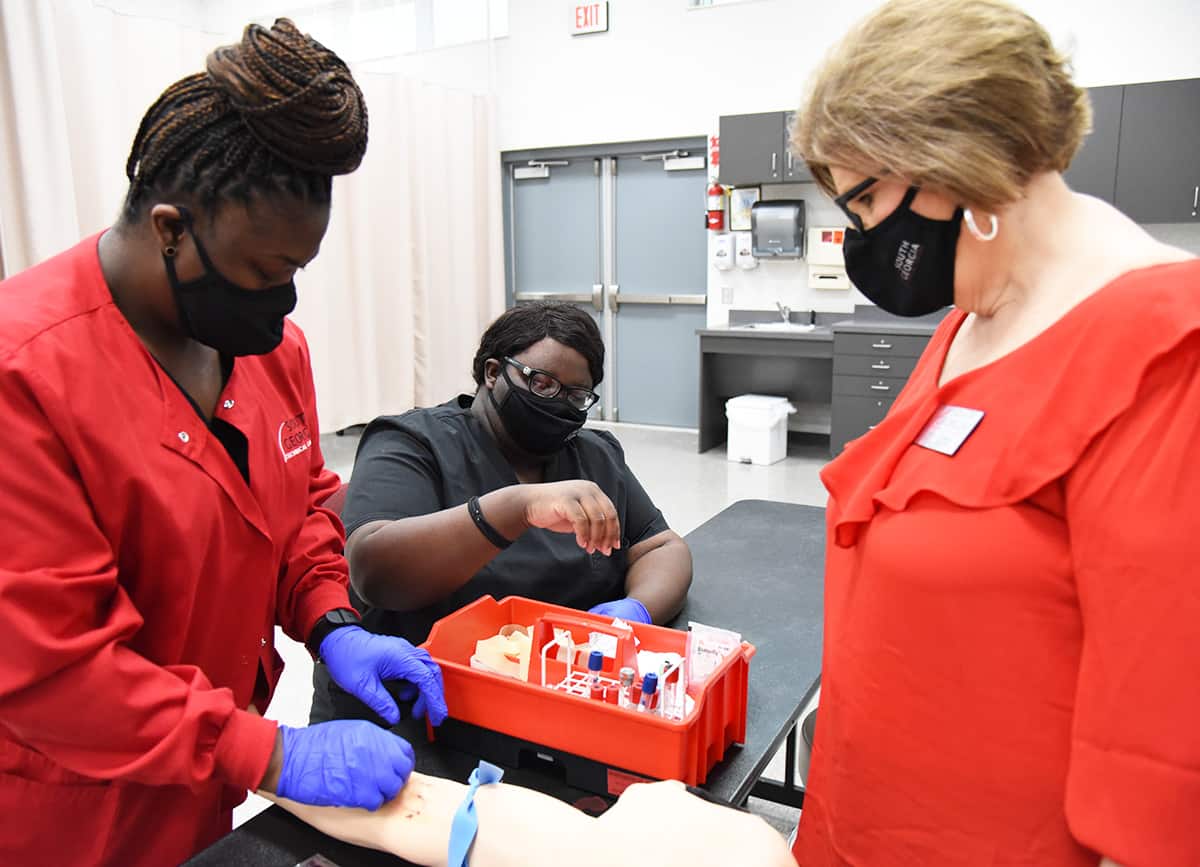Your Step-by-Step Guide to Starting Phlebotomy school With Confidence
Your Step-by-Step Guide to Starting Phlebotomy school With Confidence
Blog Article
The Path to Certification: Understanding the Phlebotomy Educating Course Journey and Its Importance
As you consider the path to accreditation in phlebotomy, it's crucial to understand the role you'll play in health care. Your training will certainly cover necessary skills, from blood collection methods to patient communication.

The Duty of Phlebotomists in Medical Care
Phlebotomists play an important function in the medical care system, serving as the vital web link in between people and crucial diagnostic screening. You'll do blood attracts, making sure examples are accumulated properly and securely. Your proficiency helps in detecting medical problems, keeping track of health, and assisting therapy decisions.
In your day-to-day communications, you'll need to establish trust fund with patients, making them really feel comfy throughout what could be a stressful experience. You're accountable for identifying and handling examples thoroughly to stop contamination or errors, which can affect examination outcomes.
Beyond this, you'll usually function together with medical professionals and nurses, communicating important details about individuals' conditions. By understanding your skills, you add meaningfully to patient care, making you a crucial part of the medical group.
Summary of Phlebotomy Training Programs
When discovering phlebotomy training programs, you'll find numerous types created to fit various schedules and finding out styles. Each program helps you develop vital abilities like blood collection and person interaction. Recognizing these alternatives is essential to picking the right path for your profession.
Sorts Of Training Programs
Several types of training programs are available for those aiming to become competent in phlebotomy. You can select from certificate programs, which commonly last a few months and focus on crucial abilities. There are additionally diploma programs that supply an even more thorough education and learning, frequently lasting approximately a year. If you're searching for a deeper understanding, an associate level in a related area may be the best fit. On the internet courses use adaptability for those stabilizing job or family dedications, enabling you to study at your own rate. Additionally, some healthcare facilities and facilities offer on-the-job training programs, providing sensible experience while you discover. Whatever course you select, each program aims to furnish you with the required skills for an effective phlebotomy career.

Secret Skills Developed
Grasping phlebotomy needs a collection of vital skills that are created with comprehensive training programs. Furthermore, interaction abilities are basic; you'll require to connect with people, clarify treatments, and put them at convenience. Each of these skills is necessary for your success as a qualified phlebotomist, making you an important possession in any healthcare setting.
Key Parts of a Phlebotomy Training Course
In a phlebotomy course, you'll concentrate on necessary topics that lay the groundwork for your future career. You'll participate in hands-on training that allows you to use what you've learned in real-world setups. Both the core educational program and functional experience are essential for your success as a phlebotomist.
Core Curriculum Review
While pursuing a phlebotomy training program, you'll run into a core educational program created to equip you with essential abilities and expertise. Phlebotomy Classes Near Me. This educational program generally includes composition and physiology, focusing on the circulatory system and understanding blood elements. You'll likewise find out around various types of blood collection methods, including venipuncture and capillary slit strategies
Furthermore, infection control and safety procedures are essential components, ensuring you recognize just how to keep a sterilized setting. You'll research patient communication, stressing interaction and empathy, which are essential for reducing individual anxiety.
Hands-On Training Experience
Getting hands-on experience is an indispensable component of your phlebotomy training program. This practical training permits you to use what you have actually found out in a real-world setting, enhancing your skills and confidence. Phlebotomy school.
In addition, you'll obtain the opportunity to communicate with clients, which is vital for establishing your interaction skills. This combination of technological efficiency and social skills is crucial for your success as a licensed phlebotomist. Inevitably, hands-on training is where theory satisfies practice, strengthening your understanding and readiness for accreditation.
Qualification and Licensing Demands
Before you can begin your career in phlebotomy, it is crucial to comprehend the certification and licensing requirements that vary by state. Many states call for phlebotomists to hold a qualification from an acknowledged organization, such as the National Phlebotomy Organization or the American Culture for Medical Pathology. These qualifications normally include passing a test that evaluates your understanding and abilities in the area.
In enhancement to certification, some states have certain licensing requirements. You may need to finish a certain number of hours in scientific method, send proof of training, or undertake a background check. It is necessary to research your state's guidelines to make certain you fulfill all necessary requirements.
Remaining informed about these requirements not only aids you secure a placement yet likewise improves your reliability as a professional. By fulfilling these needs, you'll be well on your method to an effective job in phlebotomy.
Hands-On Training and Practical Experience
Hands-on training and useful experience are necessary components of your phlebotomy education and learning, as they allow you to use theoretical understanding in real-world situations. During your training, you'll take part in supervised venipuncture, find out correct methods, and become accustomed to numerous blood collection tools. This straight involvement is essential for constructing your confidence and developing your abilities.
You'll function very closely with experienced professionals who can lead you via the subtleties of client communication and example handling. Each practice not only strengthens your understanding yet likewise prepares you for the hectic atmosphere of healthcare settings.
In addition, lots of programs include scientific turnings, permitting you to experience varied settings, from healthcare facilities to outpatient centers. This direct exposure helps you adjust to various challenges and individual demands, guaranteeing you're well-prepared for your future duty. Welcome these chances, as they're important to coming to be an experienced and thoughtful phlebotomist.
Challenges Encountered During Training
While obtaining hands-on experience is important, it's crucial to identify Phlebotomy Courses Near Me the difficulties that can develop during your phlebotomy training. Additionally, understanding the skills required for blood attracts takes practice; you may struggle with strategy initially.
Time administration can additionally be a difficulty, as balancing theory, sensible sessions, and individual commitments can feel challenging. You may deal with varying learning speeds among your peers, leading to feelings of self-doubt if you assume you're falling back. Finally, adapting to the various characters of instructors can be tough, as each might have an one-of-a-kind teaching style.
Identifying these obstacles early can prepare you for success and aid you create resilience throughout your training trip.
Profession Opportunities After Certification

As you obtain experience, you might even think about focusing on areas like pediatric or geriatric phlebotomy, providing to particular client demands. Some phlebotomists select to advance their occupations by coming to be lab professionals or pursuing further education and learning in medical care fields.
Furthermore, your accreditation can result in roles in training or managing brand-new phlebotomists, permitting you to share your expertise. With the healthcare market continuously growing, your skills will certainly constantly be in demand, paving the way for a secure and satisfying profession. Embrace the chances waiting for you!
Often Asked Questions
What Is the Common Duration of a Phlebotomy Educating Training Course?
Phlebotomy training programs commonly last around 4 to eight weeks. You'll take part in hands-on technique, class direction, and on the internet understanding. Finishing this training prepares you for accreditation and a rewarding occupation in healthcare.
Are Online Phlebotomy Courses Available?
Yes, online phlebotomy training courses are available. They provide adaptability and ease, permitting you to study at your own pace. Just validate the program is approved to fulfill certification needs and acquire useful abilities for your career.
Exactly How Much Does Phlebotomy Training Normally Price?
Phlebotomy training generally costs between $700 and $2,500, depending on the program and location. You should take into consideration factors like course length, consisted of products, and hands-on experience when picking the ideal training for you.
What Prevail Prerequisites for Phlebotomy Training?
Typical prerequisites for phlebotomy training often consist of a secondary school diploma or GED, immunizations, and a background check. Some programs may also require standard medical care knowledge or certifications, guaranteeing you're gotten ready for hands-on training.
Can I Function While Completing My Phlebotomy Training?
Yes, you can work while completing your phlebotomy training. Several pupils equilibrium jobs with their researches, but make specific to handle your time effectively to guarantee you satisfy both work and training commitments effectively.
Report this page